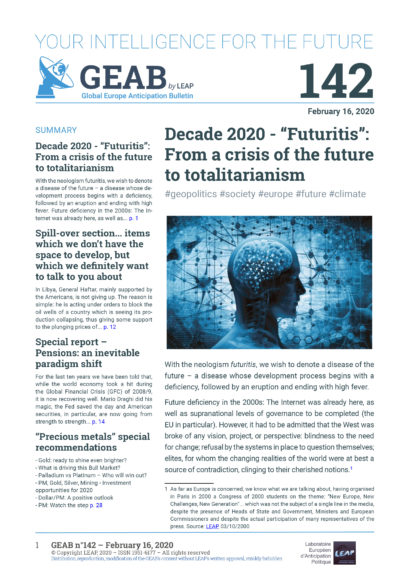GEAB 142

With the neologism futuritis, we wish to denote a disease of the future – a disease whose development process begins with a deficiency, followed by an eruption and ending with high fever.
Future deficiency in the 2000s: The Internet was already here, as well as supranational levels of governance to be completed (the EU in particular). However, it had to be admitted that the West was broke of any vision, project, or perspective: blindness to the need for change; refusal by the systems in place to question themselves; elites, for whom the changing realities of the world were at best a source of contradiction, clinging to their cherished notions.[1]
Eruption of multiple conceptions of the future in the 2010s: But things have changed a lot since then. In the past ten years, we have witnessed an equally pathological explosion of ideas concerning the future, with everyone putting forward their own predictions, innovations, projects and visions of the future, imagining the future as virgin soil, open solely to their will. In a world that is physically crowded, the future appeared as the only terra incognita open to adventurers, who are still rushing into it in great disarray. Unfortunately, the future is as crowded as the present and, without a reliable map of its harsh realities, a great pile-up of future scenarios results, perfectly manifested in today’s political and geopolitical tensions.
High fever from 2020 onwards: We are now entering the third phase of this social pathology: an outbreak of fever that consists of a vast “simplifying clean up” of the future that we believe has all the hallmarks of totalitarianism.
From futuristic hysteria to a preview of the apocalypse
A few years ago, we anticipated that the world would go from a situation of blocked horizons to an explosion of conceptions of the future. Reality exceeds imagination.
Professional social networks are the showcases of this competition of techno-business expectations seasoned with 21st century moral values: icy images of a world of right-thinking[2] and white-speaking[3] science-fiction professionals, anxious at the thought of ‘missing’ the innovation that will make them rich, where everyone is posing as an oracle.
The media, whose job it is to talk about what has happened, are also increasingly turning towards what is going to happen,[4] presenting anticipations of the future with the same aplomb as information about the past, without offering their readers the chance to get their bearings in the great intellectual and temporal ‘medley’ being offered to them.[5]
Schools, where the society of tomorrow is being formed, are passing on to their students the idea that the future will be what they make of it, without offering them a method of rationalising it.[6]
Economic and political actors are now having to “anticipate the anticipations” of their competitors/enemies, leading to new forms of paralysis resulting from the contemplation of a future reality too complex to permit any action.[7]
This showcase of futures may be the last expression of the freedom that has been blowing like a wind over the world for a little over half a century – a freedom now entrenched in this fantasised tomorrow: “the future will be what we make it”… Certainly, but how many divergent “I”s compose this “we”? And what will the product of all these inconsistent “I”s look like?
In any case, this uncontrolled proliferation of ideas about the future presents an increasingly frightening spectacle for an increasing proportion of the population, which is seeking refuge in all too familiar forms of “withdrawal”: nationalism, religiosity, securitarianism, climatism… and other rejections of a modernity judged to be driven by sorcerers’ apprentices. In 20 years, our societies have gone from “the future is not a concern” to a dramatic staging of techno-environmental visions of the future that inspire feelings of terror in large sections of the population… a “terrorism of the future”.
Solastalgia is a social pathology identified since 2005,[8] consisting of mental suffering at the thought of the disappearance of a familiar world whose exponential race of “progress gone mad” gradually excludes all humanity, creating the nostalgic feeling that “we have all become irremediably strangers in our own countries”.[9] This disease particularly affects people who are very sensitive to the prospect of future climate and environmental change. It is even referred to as pre-traumatic stress syndrome (in reference to post-traumatic stress syndrome) … a disease of the future par excellence. This brings us to the other well-known face of this futuritis, namely the morbid projection into an apocalyptic future, giving rise to extreme forms of environmentalism like Extinction Rebellion …
Of course, these two sides belong to the same coin.

Figure 1 – Symbol of the Extinction Rebellion movement.
Futurism and Fascism
The surrounding futuritis is the inevitable consequence of the gigantic societal revolution brought about by the invention of the Internet – a revolution[10] whose destructive effect (or ‘disruptive’ to speak modern) is akin to that of a war, forcing us to rebuild everything on new foundations. This collective work of rebuilding a functional society requires us to make plans, to think about tomorrow. And this is what everyone is working on. But the inadequacy of the power structures of the preceding era has, so far, prevented any coordinated work and therefore any satisfactory results, leading to feelings of inefficiency, powerlessness and anger.
In a world that urgently needs to be rebuilt, with powerless elites, what paths will angry populations take to get out of the trap into which the complexity of the upcoming systemic transition has plunged them? The magnitude of that task forces us to fear the worst…
The historical situation in which humankind finds itself is unprecedented in terms of size, but it is nevertheless irresistibly reminiscent of that other troubled epoch that presided over the advent of the great totalitarian experiences of the twentieth century – Communism, Fascism, Nazism etc. – which were also rooted in a changing relationship to time and progress, particularly as revealed by futurism, the artistic movement born in Italy, precisely one hundred years before the futuritis we are dealing with today.
Let us be clear on one point: Italian Futurism is not fascist; yet, it provided fertile intellectual soil for Mussolini’s “moderno-reactionary” project.[11]
Born in 1909, around the poet Marinetti, this movement broke with the classical aesthetic tradition to celebrate the representations of modernity that were the city, machines and speed. The cult of trans-humanist innovation is the contemporary version of this idea. From the outset, Marinetti integrated a political dimension into his artistic thought, involving reflection on new social values… The “Gutmensch “[12] embedded in descriptions of a technological future on social and mainstream media is a modern echo of Marinetti’s ideas.
History does not repeat itself… but its mechanisms do! And other parallels can be demonstrated…
The cult of youth and climatism Login

Oil/Libya: War or US shale collapse? In Libya, General Haftar, mainly supported by the Americans, is not giving up. The reason is simple: he is acting under orders to block [...]
For the last ten years we have been told that, while the world economy took a hit during the Global Financial Crisis (GFC) of 2008/9, it is now recovering well. [...]
Gold: ready to shine even brighter? 2019 was a big year in Precious Metals (PMs). After two years of declining prices following the 2016 peak, a floor was reached around [...]

Comments